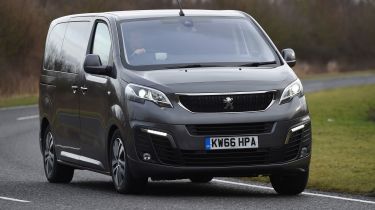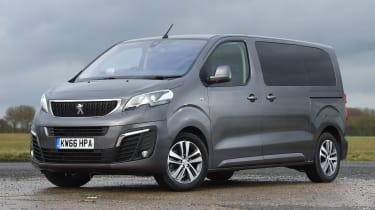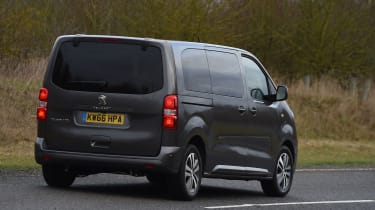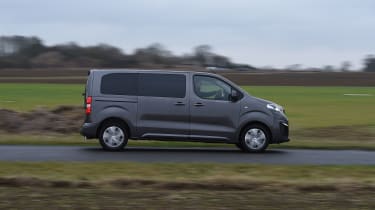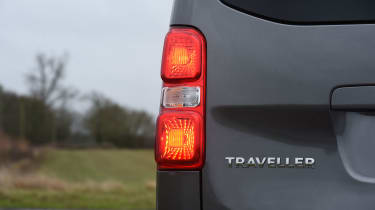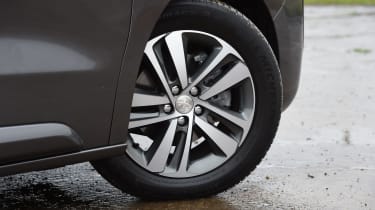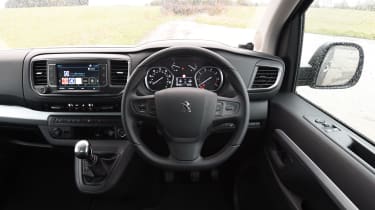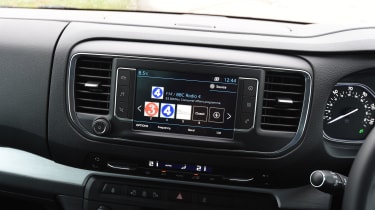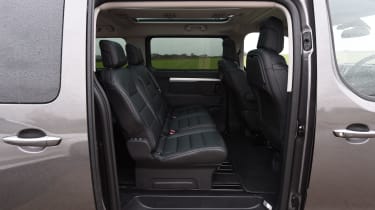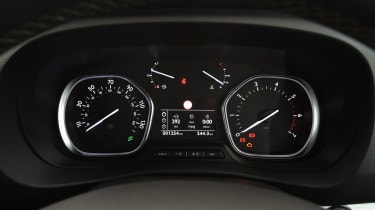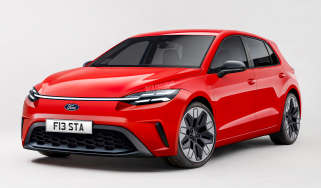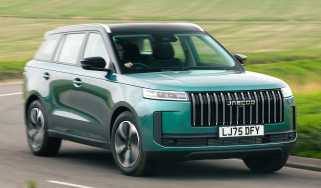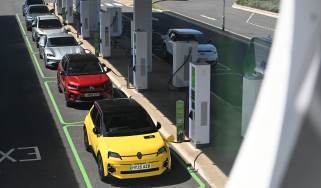Peugeot Traveller review
If you need an eight-seater family van or executive shuttle, the Peugeot Traveller deserves a place on your shortlist

The market for eight-seater vehicles in the UK is small but meaningful, and the Peugeot Traveller is the French brand’s most convincing entrant yet. Peugeot’s confidence in the new people-carrier is best demonstrated by the choice of name. Whereas its predecessor simply added a ‘Teepee’ onto the title of the standard Expert van, the Traveller gets a name all of its own, distancing itself from its commercial vehicle origins.
The Traveller has some tough competition, not least from within its own family. Citroen and Toyota also produce very similar people carriers, named the Spacetourer and Proace Verso respectively. Running on the same platform and with the same engines as the Traveller, these three models are only separated by trim, equipment levels, pricing and some small design tweaks.
The three vans occupy somewhat of a middle ground in the size stakes. Though it’s available in three body lengths, even at its largest the Traveller is smaller than the likes of the Volkswagen Caravelle and Mercedes V-Class. It remains slightly bigger than traditional people carriers like the Ford Galaxy and SEAT Alhambra, so it faces an onslaught from both sides. It also has to entice family buyers from the newly redesigned Peugeot 5008 seven-seat SUV – a difficult task.
Used - available now

2024 Nissan
Ariya
12,471 milesAutomaticElectric
Cash £25,490
2021 Lexus
UX 300e
39,392 milesAutomaticElectric
Cash £16,950
2023 Hyundai
i30
23,040 milesManualPetrol1.0L
Cash £14,801
2021 Vauxhall
Mokka
16,283 milesAutomaticPetrol1.2L
Cash £15,795More interesting is where Peugeot’s positioned itself in the market. Leaving its sister vans to mop up the entry-level customers, the Traveller doesn’t offer a basic trim level. Instead, it begins with Active spec, which is packed with luxury features like a seven-inch infotainment display, climate control and rear tinted windows.
Step up to Allure, and you’ve practically got a limousine, stuffed with leather upholstery, electric and heated front seats and keyless entry. This is where Peugeot hopes to win buyers - with those looking to transport adults rather than families. It sees these Travellers being used as taxis, airport shuttles, or just general business transport.
• Best MPVs and people carriers
Engines are limited to diesels, though there’s a wide array of power outputs to choose from. Entry-level vans are powered by a 94bhp 1.6-litre, but there’s also a 114bhp 1.6 and 2.0-litre versions with 148bhp or 178bhp. Whatever engine you go for, economy is a real strong point – knocking most other van-based MPVs into a cocked hat with 50+mpg available from all but the most powerful engine.
The Peugeot Traveller is a world away from its predecessor, the rough and agricultural Expert Teepee. While the newcomer is still unmistakably a van, it’s to Peugeot’s credit that it feels a world away from its commercial vehicle predecessor on the road as well as when you’re sat inside.
Car-like it may be, but the Traveller is still a van, and inside it’s every bit as spacious as the load-lugger it shares a body with. Available with eight seats across three body lengths, no matter which Traveller you choose there’s space to seat adults in all three rows. Boot space is generous, if awkwardly shaped, and massive sliding doors mean the Traveller is very easy to get into and out of.
Though it’s unlikely to draw much custom from the ranks of private buyers, the Peugeot Traveller stands out as an executive minibus or small luxury shuttle. That’s mostly due to price – to spec a similarly sized VW Caravelle or Mercedes V-Class to the same level would set you back significantly more money and the Peugeot can live with this company in terms of its cabin ambience. Those vans can’t compete with the Traveller’s running costs either – it has impressively low fuel consumption and emissions for such a big, heavy vehicle.
Engines, performance and drive
The Peugeot Traveller rides on an adapted version of the EMP2 platform underpinning MPVs like the Citroen C4 Picasso. That could be why ride and handling are surprisingly good for a van-based people carrier. It doesn’t suffer from excess bounce in the rear suspension when it’s unladen, and proves comfortable across all but the worst roads.
Good visibility and a tight turning circle mean the Traveller feels smaller on the road than its bulk suggests, and it proves pretty easy to manoeuvre and park thanks to large door mirrors and standard-fit rear parking sensors.
The Traveller is reasonably settled at motorway speeds, but twisting A and B roads highlight the steering, which is low geared and vague without much feedback. The gearshift, too, isn’t up to much, feeling loose and imprecise – it doesn’t have the same pleasing action as the ‘box found in a Ford Tourneo Custom.
Two different automatic gearboxes are available – an ETG6 automated manual on lower-powered models or a traditional EAT6 torque converter on the most powerful 178bhp engine. We’d avoid the automated manual like the plague, as it offers slow, jerky shifts that leave you with no confidence when pulling out at fast junctions, for example. By contrast the EAT6 is smooth and changes gear quickly, but it isn’t available on any other engines bar the most powerful one – making it an expensive choice.
The driving position is resolutely upright and van-like. While this ensures good visibility out of the front, it’s not perfect – taller drivers will find long legs get cramped quite quickly. We found the active safety aids such as optional-fit lane departure warning were far too trigger-happy, leading us to turn them off almost instantly. Allure models get a heads-up display though, which works well, and means you don’t have to take your eyes off the road so often.
Engines
Two engines are available for the Peugeot Traveller – a 1.6-litre or a 2.0-litre BlueHDi diesel, with a choice of four power outputs between them. The range kicks off with a 95bhp 1.6-litre, which is fine for town work but not much else – if the back was loaded up with six passengers, you’d probably be struggling to keep up with traffic. A top speed of just 90mph means it suffers on the motorway, too.
Moving up, there’s a 114bhp version of the same engine, which shaves a couple of seconds from the van’s 0-60mph time and boosts top speed to 99mph. That’s better, but if it were our money we’d plump for the 2.0-litre 148bhp unit. This is a really flexible engine, with bags of torque helping you press on without having to rev too hard. It feels strong and should have no problems transporting a full load of passengers and luggage.
The 178bhp engine is more powerful still, but it seems like a waste of money when the 148bhp unit is so good.
MPG, CO2 and Running Costs
Peugeot and sister brand Citroen have some of the best average economy across their passenger car ranges, so it’s no surprise that the Traveller continues this trend. Compared with the VW Caravelle, which offers mpg figures in the mid-30s for most models, it’s only the most powerful Peugeot Traveller that dips below 50mpg.
Official figures suggest the economy champ is the short-wheelbase 115bhp 1.6-litre BlueHDi diesel equipped with stop-start technology. It claims to return an astonishing 55.4mpg, with CO2 emissions of just 133g/km, ensuring a reasonable tax bill for private and business buyers alike.
Our favourite 148bhp engine doesn’t shame itself, though, with an impressive return of 53.3mpg on the combined cycle and CO2 emissions of 139g/km. We’d expect you to get closer to official figures with the higher-powered unit, too, as you won’t need to work the engine so hard to keep up with traffic.
Stop-start technology is available in various forms across the range, and the resulting fuel savings mean it’s well worth buying a Traveller with it.
Insurance groups
The Traveller starts out in Group 11E for lower-powered models. This quickly rises, and our favourite 148bhp engine is in insurance group 22E. The range tops out at group 24E for top-spec models. That’s still lower than even entry-level versions of the Volkswagen Caravelle or Mercedes V-Class, which start at group 28E and 34E respectively.
Interior, design and technology
The Peugeot Traveller is a smart-looking vehicle on the outside, aided by LED daytime running lights and body-coloured bumpers as standard. It’s impossible to disguise the car’s commercial vehicle origins, thanks to slab-sided styling, but a smart front grille and good-looking alloy wheels on Allure models can at least distract you from it.
Most Travellers will be silver, black or white, but if you’re feeling more adventurous it’s also available in a deep Dragoon Blue, Rich Oak or bold Amber Red.
Inside, the Traveller can’t compete with more expensive models like the VW Caravelle when it comes to interior quality. It’s not that it’s poorly put together – build quality is excellent and there’s a notable absence of squeaks and rattles. It’s just material quality that isn’t up to the lofty heights of premium rivals, though if you’re coming from the old Expert Teepee you’ll be very pleasantly surprised.
An upright centre console contains a slick seven-inch touchscreen, which is mounted high up so you don’t need to take your eyes too far off the road to operate it. You will need to lean forward, though, and that can be a stretch for smaller drivers. On top of the dash sits a heads-up display, which is easy to read and gives all the information you need.
Active models have cloth upholstery but still retain a leather steering wheel, which feels comfortable in hand, while the solid metal gearknob is very solid and reassuring. Stepping up to Allure brings you easy-to-clean leather upholstery for added luxury, while it also adds heating to the two front seats as well as electric adjustment. Dual-zone climate control is standard, as are cruise control, electric mirrors, automatic headlights and wipers, and a handy mirror to survey those sat in the back seats.
Sat-nav, stereo & infotainment
A seven-inch touchscreen infotainment system comes as standard on the Traveller, and we found it pretty easy to use. It offers up all you’d expect – DAB, Bluetooth connectivity, a USB port and aux-in, as well as Mirror Link Smartphone connectivity, but Apple CarPlay and Android Auto are sorely missed.
Sat-nav is a £240 optional extra.
Practicality, comfort and boot space
Passenger space is where the Traveller shines, with even the Compact models offering space for adults in all three rows. Unlike some rivals, including its Citroen and Toyota siblings, the Traveller isn’t available with a double front passenger seat, so it’s limited to eight rather than nine seats.
Massive sliding doors mean it’s simple to get into and out of, and even rear seat passengers get a good view out thanks to large side windows. The rearmost two don’t open, though, so the air-conditioning will be getting a workout when the van is fully loaded.
Boot space in the standard wheelbase model is a generous 640 litres with all three rows in place, though it’s rather tall and shallow – you’ll be stacking shopping bags on top of each other.
Sliding rear seats allow you to strike a balance between leg room and rear seat space - especially important in Compact models, where rear legroom is tight unless some boot space is sacrificed. Both rear rows of seats are removable, and when out they leave a truly cavernous load area.
Cabin storage is decent, with a sizable glove box. The door bins are large, but positioned so low down that they’re difficult to access while driving.
The problem with a van-based MPV is flexibility. While both rear rows of seats slide and fold, they don’t leave a flat loading bay unless you remove them entirely. Taking them out is a two-person job, as they’re very heavy. A car like a SEAT Alhambra simply folds the seats directly into the floor, leaving a flat load bay – a much more practical option to have.
Size
It might surprise you to find out that compared to an equivalent Volkswagen Transporter Combi, the Peugeot Traveller is actually wider, at 2,204mm. It certainly doesn’t look it, or feel it from in the cabin. It is shorter than the Transporter, though both in length and height, so it should prove easier to park.
Leg room, head room & passenger space
All three rows of seats offer enough space for a six-foot adult to sit comfortably, which is as good as you can say about the Mercedes V-Class or Volkswagen Caravelle. It’s certainly a vast improvement on most seven-seat people carriers, which tend to have third rows that are only really suited for children.
The high roofline means headroom is plentiful, too, plus there are ISOFIX mounting points in all six rear seats. Access to the third row is pretty simple – the middle seat tilts forward to provide easy step-through access.
Boot
Even the smallest Compact model still gets a 280-litre boot with all three rows in place. This rises to 640 litres for the standard model or 1,060 for the long-wheelbase. The load space is fairly tall and shallow, so you might find yourself stacking bags on top of one another, but it’s fine for suitcases and you can always slide or fold the rear row if you’re not using it to improve rear luggage space.
Remove all the seats and, in the standard length model, you’re left with a cavernous 3,200 litre load bay. You will need somewhere to store the seats, though, and they’re very bulky and heavy. While they don’t fold flat into the floor, you can fold them up and push them to the front of the load area to minimise their impact, and there’s still an uninterrupted flat area of almost a metre behind them.
Reliability and Safety
Even though it’s so new, there’s little under the skin of the Traveller that hasn’t been well-proven across many thousands of miles in other models. The engines all see service across Peugeot and Citroen’s ranges, while the EMP2 platform the Traveller is based on has been used for years underpinning the likes of the Citroen C4 Picasso.
The Traveller is too new to have made an appearance in our annual Driver Power survey, but Peugeot itself ranks 17th overall out of 32 manufacturers surveyed.
Family buyers should be reassured by its safety credentials, though. All Travellers get a five-star crash safety rating from the experts at Euro NCAP, with an excellent score for child protection. Driver assistance packs like a drowsiness monitor, active cruise control and optional lane-departure warning and road sign recognition mean the Traveller also scored highly in the safety assist category, while autonomous braking should help avoid any low-speed collisions.
Warranty
The Peugeot Traveller offers up a three-year warranty, with unlimited mileage in the first two – handy for high-mileage drivers. That’s on par with most rivals, but the mechanically identical Toyota Proace gives buyers five years or 100,000 miles of cover.
